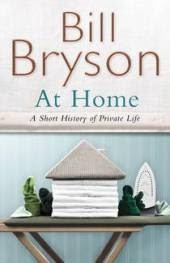 I already knew Bill Bryson's recent book At Home sounded intriguing, though I hadn't thought much about it. He's one of those writers I've never read, but who provide a constant faint reminder, like someone standing on the edge of your peripheral vision with a sign that says "Read Me."
I already knew Bill Bryson's recent book At Home sounded intriguing, though I hadn't thought much about it. He's one of those writers I've never read, but who provide a constant faint reminder, like someone standing on the edge of your peripheral vision with a sign that says "Read Me."
Bryson was on MPR's Midmorning show today discussing the book, so now he's standing right in front of me, jumping up and down with the Read Me sign painted over with red letters.
In writing the book, which was inspired by the 160-year-old rectory where he lives with his family in England, Bryson researched the history of home life and came up with many intriguing facts. Here are a few:
- Medieval and Renaissance-era Europeans didn't wash their bodies very often. I already knew this, but I didn't know there are multiple recorded instances of native New Worlders exclaiming how much the Europeans stank.
- Lighting in the home was incredibly bad until gas lights became common in the latter half of the 19th century. Again, this was not news. But Bryson writes about what it's like to actually read by candlelight (both dim and annoyingly flickery). He pointed out that the amount of light cast when we open our refrigerator doors is more than an average middle class family would have shared in the evening. And that the furniture in houses was usually left pushed up against the walls so that no one would run into it when crossing rooms in the dark.
- While there is lots of information on food and eating available to historians, there's almost none on what people used for toilet paper.
- Even lower-middle-class English people would have had at least one servant. Paraphrasing, Bryson said that servants were the equivalent of home appliances. Again, not really news to me, having read a lot and watched the 1900 House, but I didn't have the detail. Churchill's estate (which is not anywhere near the largest) would have had a hundred servants inside the house and up to several hundred in the stables and gardens. The servants got up before the master's family and went to bed after them, and their work hours and conditions were completely unregulated. The only break they got was that the master would split his time between the country house and the London house, so the servants had it easier when the family was not in residence. Despite all this, working as a servant was cushy work compared to factory work. (Or coal mining, I'd imagine.)
___
All of Bryson's other books sound interesting, but the one that I'd like to read after At Home is the Dictionary of Troublesome Words: A Writer's Guide to Getting It Right.


1 comment:
I've only read A Walk in the Woods - about Bryson's attempt to walk the Appalachian Trail - but loved the details and his sense of humor. I'll check out the newest book.
Post a Comment